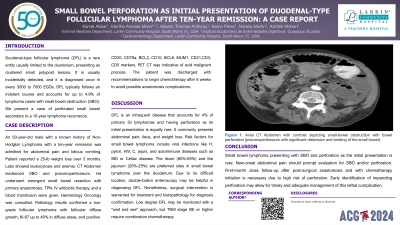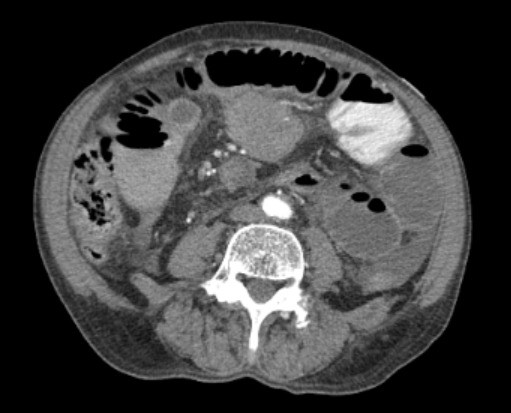Monday Poster Session
Category: Small Intestine
P3297 - Small Bowel Perforation as Initial Presentation of Duodenal-type Follicular Lymphoma After Ten-year Remission: A Case Report
Monday, October 28, 2024
10:30 AM - 4:00 PM ET
Location: Exhibit Hall E

Has Audio
- KA
Kamal Akbar, MD
Larkin Community Hospital
South Miami, FL
Presenting Author(s)
Kamal Akbar, MD1, Martha Arevalo-Mora, MD1, Adarsh Thomas Anthony, MD1, Aaron Perez, DO1, Natalia Martin, DO1, Karthik Mohan, DO2
1Larkin Community Hospital, South Miami, FL; 2Larkin Community Hospital, Hialeah, FL
Introduction: Duodenal-type follicular lymphoma (DFL) is a rare entity usually limited to the duodenum, presenting as clustered small polypoid lesions. It is usually incidentally detected, and it is diagnosed once in every 3000 to 7000 EGDs. DFL typically follows an indolent course and accounts for up to 4.9% of lymphoma cases with small bowel obstruction (SBO). We present a case of perforated small bowel secondary to a 10-year lymphoma recurrence.
Case Description/Methods: An 83-year-old male with a known history of Non-Hodgkins Lymphoma with a ten-year remission was admitted for abdominal pain and bilious vomiting. Patient reported a 25-lb weight loss over 3 months. Labs showed leukocytosis and anemia. CT Abdomen evidenced SBO and pneumoperitoneum. He underwent emergent small bowel resection with primary anastomosis. TPN, IV antibiotic therapy, and a blood transfusion were given. Hematology Oncology was consulted. Pathology results confirmed a low-grade follicular lymphoma with follicular diffuse growth, KI-67 up to 40% in diffuse areas, and positive CD20, CD79a, BCL2, CD10, BCL6, MUM1, CD21, CD3, CD5 markers. PET CT was indicative of avid malignant process. The patient was discharged with recommendations to begin chemotherapy after 6 weeks to avoid possible anastomosis complications.
Discussion: DFL is an infrequent disease that accounts for 4% of primary GI lymphomas and having perforation as its initial presentation is equally rare. It commonly presents abdominal pain, ileus, and weight loss. Risk factors for small bowel lymphoma include viral infections like H. pylori, HIV, C. jejuni, and autoimmune diseases such as IBD or Celiac disease. The ileum (60%-65%) and the jejunum (20%-25%) are preferred sites in small bowel lymphoma over the duodenum. Due to its difficult location, double-ballon enteroscopy may be helpful in diagnosing DFL. Nonetheless, surgical intervention is warranted for treatment and histopathology for diagnosis confirmation. Low degree DFL may be monitored with a "wait and see" approach, but TNM stage IIIE or higher require combination chemotherapy.
Conclusion:
Small bowel lymphoma presenting with SBO and perforation as the initial presentation is rare. New-onset abdominal pain should prompt evaluation for SBO and/or perforation. First-month close follow-up after post-surgical anastomosis and with chemotherapy initiation is necessary due to high risk of perforation. Early identification of impending perforation may allow for timely and adequate management of this lethal complication.

Disclosures:
Kamal Akbar, MD1, Martha Arevalo-Mora, MD1, Adarsh Thomas Anthony, MD1, Aaron Perez, DO1, Natalia Martin, DO1, Karthik Mohan, DO2. P3297 - Small Bowel Perforation as Initial Presentation of Duodenal-type Follicular Lymphoma After Ten-year Remission: A Case Report, ACG 2024 Annual Scientific Meeting Abstracts. Philadelphia, PA: American College of Gastroenterology.
1Larkin Community Hospital, South Miami, FL; 2Larkin Community Hospital, Hialeah, FL
Introduction: Duodenal-type follicular lymphoma (DFL) is a rare entity usually limited to the duodenum, presenting as clustered small polypoid lesions. It is usually incidentally detected, and it is diagnosed once in every 3000 to 7000 EGDs. DFL typically follows an indolent course and accounts for up to 4.9% of lymphoma cases with small bowel obstruction (SBO). We present a case of perforated small bowel secondary to a 10-year lymphoma recurrence.
Case Description/Methods: An 83-year-old male with a known history of Non-Hodgkins Lymphoma with a ten-year remission was admitted for abdominal pain and bilious vomiting. Patient reported a 25-lb weight loss over 3 months. Labs showed leukocytosis and anemia. CT Abdomen evidenced SBO and pneumoperitoneum. He underwent emergent small bowel resection with primary anastomosis. TPN, IV antibiotic therapy, and a blood transfusion were given. Hematology Oncology was consulted. Pathology results confirmed a low-grade follicular lymphoma with follicular diffuse growth, KI-67 up to 40% in diffuse areas, and positive CD20, CD79a, BCL2, CD10, BCL6, MUM1, CD21, CD3, CD5 markers. PET CT was indicative of avid malignant process. The patient was discharged with recommendations to begin chemotherapy after 6 weeks to avoid possible anastomosis complications.
Discussion: DFL is an infrequent disease that accounts for 4% of primary GI lymphomas and having perforation as its initial presentation is equally rare. It commonly presents abdominal pain, ileus, and weight loss. Risk factors for small bowel lymphoma include viral infections like H. pylori, HIV, C. jejuni, and autoimmune diseases such as IBD or Celiac disease. The ileum (60%-65%) and the jejunum (20%-25%) are preferred sites in small bowel lymphoma over the duodenum. Due to its difficult location, double-ballon enteroscopy may be helpful in diagnosing DFL. Nonetheless, surgical intervention is warranted for treatment and histopathology for diagnosis confirmation. Low degree DFL may be monitored with a "wait and see" approach, but TNM stage IIIE or higher require combination chemotherapy.
Conclusion:
Small bowel lymphoma presenting with SBO and perforation as the initial presentation is rare. New-onset abdominal pain should prompt evaluation for SBO and/or perforation. First-month close follow-up after post-surgical anastomosis and with chemotherapy initiation is necessary due to high risk of perforation. Early identification of impending perforation may allow for timely and adequate management of this lethal complication.

Figure: Axial CT Abdomen with contrast depicting small-bowel obstruction with bowel perforation (pneumoperitoneum with significant distension and twisting of the small bowel).
Disclosures:
Kamal Akbar indicated no relevant financial relationships.
Martha Arevalo-Mora indicated no relevant financial relationships.
Adarsh Thomas Anthony indicated no relevant financial relationships.
Aaron Perez indicated no relevant financial relationships.
Natalia Martin indicated no relevant financial relationships.
Karthik Mohan indicated no relevant financial relationships.
Kamal Akbar, MD1, Martha Arevalo-Mora, MD1, Adarsh Thomas Anthony, MD1, Aaron Perez, DO1, Natalia Martin, DO1, Karthik Mohan, DO2. P3297 - Small Bowel Perforation as Initial Presentation of Duodenal-type Follicular Lymphoma After Ten-year Remission: A Case Report, ACG 2024 Annual Scientific Meeting Abstracts. Philadelphia, PA: American College of Gastroenterology.
